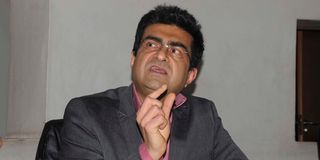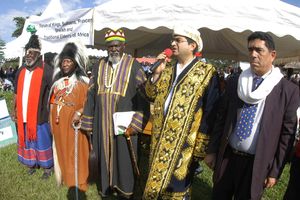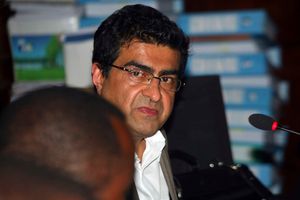
Kamlesh Pattni.
Sanctioned by the West, welcomed in Niamey, the seat of power in Niger, Kamlesh Pattni – seen by some as the master of deceit with unmatched survival instincts – raises eyebrows whenever his name is mentioned in Kenya and Zimbabwe.
After pictures of Mr Pattni signing a minerals deal with Nigerien government officials surfaced online, sources in the West African country that has been under military rule since July 2023 say the controversial businessman has also positioned himself as a “financial consultant”, offering to help the sanctions-hit nation “unlock its mineral wealth”.
“It is a structural revolution because, from now on, Niger’s gold will no longer just be extracted, it will be processed here for the benefit of Nigeriens,” said Col Ousmane Abarchi, the minister in charge of minerals, after signing the agreement.
The minister added that the deal with Mr Pattni, under the auspices of the National Council for the Defence of the Fatherland (CSNP), opens a new era of national construction.
Col Abarchi said the junta is out to protect the country’s economy from illegal networks. Mr Pattni is accused by the West of being the lord of such networks.
Mr Pattni said he welcomed the agreement with Niger and was okay with its terms.
It is still not clear if the Nigerien government has done due diligence on Mr Pattni, who has been at the centre of gold-related scandals – the latest being in Zimbabwe – or whether the junta is part of a scheme that could defraud the public.
Mr Pattni has been synonymous with such deals for years.
In 1992, a young nondescript businessman, Kamlesh Manskulal Damji Pattni, walked into the Central Bank of Kenya and left with billions of shillings.

Businessman Kamlesh Pattni.
His company, Goldenberg International, claimed to export gold and diamonds that Kenya did not produce, exploiting a government compensation scheme meant to boost foreign exchange.
By the time the scandal unravelled, it is estimated that Sh158 billion (then $1.5 billion) – nearly 10 per cent of Kenya’s Gross Domestic Product at the time – had vanished.
The Justice Samuel Bosire-chaired Goldenberg Commission of Inquiry, which exposed a web of high-level political collusion, would later brand Mr Pattni “a thief and a cheat”.
Despite the damaging findings, Mr Pattni escaped serious punishment and became an international fugitive.
He is now accused of contributing to the economic ruin Zimbabwe faces.
After years of legal battles linked to Goldenberg International and later duty-free shops at Jomo Kenyatta International Airport in Nairobi, Mr Pattni became pastor, christening himself “Brother Paul”, before flying to Zimbabwe from his operational base in Dubai, the United Arab Emirates.
More than three decades after Goldenberg, Mr Pattni has set his sights on Niger, and the pattern appears chillingly familiar.
Just as he exploited Kenya’s economic crisis in the 1990s, Mr Pattni stands accused of offering his “financial expertise” to Niger’s junta, a regime desperate to circumvent sanctions by Ecowas and the West.
Uranium and gold exports
Sources in Niger, who spoke in confidence, suggest Mr Pattni is already positioning himself to control the country’s uranium and gold exports.
The Goldenberg scheme in Kenya was no accident. It was a calculated strike against a country in turmoil.
Kenya was a powder keg in 1992. President Daniel arap Moi, fully complicit in the scheme, faced an existential crisis.
The fall of the Berlin Wall in 1989 had unleashed winds of change, dismantling the Cold War chessboard where Western powers propped up leaders like Moi and Mobutu Sese Seko in Zaire – now the Democratic Republic of Congo – to counter the Soviet Union’s influence and communism.
With that support evaporating, Moi’s regime teetered on the brink of multi-party democracy, a prospect that threatened his grip on power.
Opposition candidates, buoyed by popular support, were gaining momentum and President Moi needed cash to crush them by funding rigged elections, silencing dissenters and buying loyalty.
Mr Pattni’s robbery unfolded like a high-stakes chess game across a triad of secretive locations that formed the backbone of his empire.
From his private office on School Lane in Westlands, Nairobi – a nondescript hub buzzing with whispered meetings and forged documents – he orchestrated the intricate moves, plotting exports that never happened.
This lair served as the nerve centre, where Pattni and his cronies mapped out the deception at night.
Then the action shifted to his Exchange Bank offices in Nairobi’s bustling city centre, a facade of legitimacy where dirty money was laundered through a maze of accounts, turning stolen funds into untraceable wealth.
Finally, the pieces converged at State House, Nairobi – President Moi’s fortified stronghold – where Mr Pattni delivered suitcases stuffed with money which was used for bribery.
The loot greased the wheels of corruption and heavily tainted Kenya’s first multi-party elections in 1992.
“The Goldenberg Ghost”, a 2021 documentary by Al Jazeera, brought the triad to light, with anonymous insiders describing late-night handoffs.
“Pattni would arrive under darkness, suitcases in tow, ensuring Moi’s loyalty while lining his own pockets,” the documentary said.

Goldenberg scandal architect Kamlesh Pattni.
“The plan Pattni suggested would mean the dirty money, in dollars, would be flown to Harare, where it would be declared as proceeds of gold exported by Suzan General Trading.”
Funds flowed in a dizzying loop. Fake exports generated compensation claims, which were funnelled through Exchange Bank to offshore accounts, and back into Moi’s election campaign coffers.
For young Kenyans today, this isn’t just history. It is a stark lesson on how crises breed predators, with Mr Pattni thriving on president Moi’s desperation and turning a nation’s vulnerability into his personal automated teller machine.
The fallout bordered on a catastrophe.
Hyper-inflation ravaged Kenyan households, jobs disappeared and the Goldenberg scandal eroded faith in democracy, leaving wounds that are yet to heal more than three decades later.
When the courts in Kenya finally moved against Mr Pattni and the country became too complicated for him to operate in, he fled to Zimbabwe.
There, he reportedly orchestrated another audacious fraud – smuggling gold under the guise of religious exports.
Sanctions and chaos
A 2019 Al Jazeera investigation implicated pastors and politicians in the scheme. It even shook President Emmerson Mnangagwa’s inner circle.
Ever the survivor, Mr Pattni slipped away once more. Zimbabwe of the 2010s was in a crisis-ridden stage, much like Kenya’s in the 1990s.
Hyper-inflation and international sanctions had crippled the economy of Zimbabwe, creating a fertile ground for opportunists like Mr Pattni.
He exploited the vulnerability, posing as a saviour while smuggling gold through religious networks and turning pastors into unwitting pawns.
Like the case in Kenya, Mr Pattni built a web of influence, drawing on the same cunning that had served him in Nairobi’s shadows.
The Al Jazeera investigation quoted a former associate: “Pattni did not just steal gold, he corrupted souls, turning preachers into smugglers and officials into accomplices.”
The pattern of preying on instability underscores Kamlesh Pattni’s modus operandi – identify a leader in peril, offer quick fixes and vanish with the spoils.
In a statement in 2020, the National Crime Agency of the United Kingdom linked Mr Pattni to money-laundering rings that spanned Africa, calling him a “chameleon-like threat” who adapts to any crisis, leaving devastation in his wake.
The US Federal Bureau of Investigations and British authorities list Mr Pattni as a fugitive, wanted for fraud, money-laundering and conspiracy.
Even so, he has signed an agreement with Niger’s military junta, a regime at odds with Western powers and the Economic Community of West African States.
Accused of leading an international network of gold smuggling and money-laundering, Mr Pattni was sanctioned by the US and the UK last year.

Mr Kamlesh Pattni at the High Court. PHOTO / FILE
According to the FBI’s 2024 transnational crime alert, Mr Pattni’s operations “exploit vulnerable states for personal gain”.
The Niger deal involves uranium and gold extraction, with Mr Pattni promising billions of dollars in revenue while seeking control over exports.
Niger, isolated after its 2023 coup and facing insurgencies, is the latest in a line of desperate African regimes Mr Pattni targets.
From Moi’s and Mr Mnangagwa’s economic crises, and now Niger’s isolation that has hit it hard, Mr Pattni capitalises on turmoil where others see only risk.
Interpol’s red notice describes him as a “high-risk financial operative” with assets in the UAE and Switzerland, trophies of his crimes.
He is reportedly used the same tactics in Niger – sweet-talking military leaders with promises of quick riches – all while evading extradition through diplomatic loopholes. His triad in Kenya was the blueprint.
As the FBI and the UK ramp up their pursuit, Mr Pattni’s ability to remain one step ahead is nothing short of shocking.
Political desperation
A 2022 UK National Crime Agency report details how he uses shell companies to launder funds, turning stolen millions into legitimate empires.
One anonymous FBI source told Al Jazeera for the documentary that Mr Pattni is like a “virus that infects economies and mutates to survive”.
In Kenya, he is said to have bribed his way out amid Moi’s political desperation. In Zimbabwe, he vanished amid sanctions chaos.
Now, in Niger, Mr Pattni is betting on anti-Western sentiments to shield him, potentially netting billions of dollars more.
How this ends will be another colourful chapter in Mr Pattni’s life.







